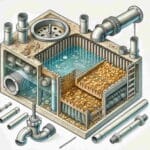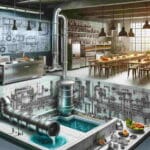Hood Cleaning: What Every Restaurant Needs to Know

Every restaurant strives to create the best experience for their patrons, but it is a tough business. Margins are tight and running lean is important. Is cutting back on hood cleaning the way to go? Absolutely not. Without commercial hood cleaners performing routine and specialized maintenance, you risk the very business you are striving to protect.
Why Call in Commercial Hood Cleaners?
Fire is a major risk
Range hoods help keep grease, odors, and fumes out of the kitchen. Since grease builds up on the filters, neglecting regular maintenance from commercial hood cleaners means increasing the risk of fire. Cooking equipment is the biggest fire risk in any kitchen environment. Failure to clean the hood means failure to keep your team and your dinner guests safe. Reduce the risk of grease fires by ensuring that the kitchen hoods are kept clean and well-maintained.
Let’s Clear the Air
The hood also plays a big role in indoor air quality. A dirty hood and clogged up filters lowers the air quality for your workers, and that air can also escape into the dining room and affect your guests. Any restaurant that suffers from poor indoor air quality is not a restaurant that will stand out among its competition. Even if the food is wonderful, it is the entire experience on site – and the happiness of the team preparing the food – that make all the difference in this tough market.
Failing Inspections
Restaurant owners expect unannounced visits from food and safety inspectors – which is another reason to have commercial hood cleaners performing regular cleanings. A dirty range hood with a buildup of grease and bad odors wafting out of the kitchen will not sit well will with the inspector; any fines or closures affect more than your bottom line. They also affect your reputation.
Save Money by Planning Ahead
It costs more to re-open after a fire or forced closure than it does to ensure the kitchen hood is properly cleaned. Restaurant life is busy, so instead of letting this slip the mind, work with commercial hood cleaners that will assess how often you need regular maintenance. This will differ by restaurant type. Any place based on fast food tends to have more grease (from fries, chicken tenders, etc.). These hoods need cleaning more often than a place that does little to no frying or hot stovetop work. The right commercial hood cleaners understand that there is no “one size fits all” schedule and will, instead, take the time to get to know you, your business, and your menu and then help you set up a schedule accordingly.
What to Expect from Commercial Hood Cleaners?
Commercial hood cleaners do more than just clean the hood. Restaurant owners should expect a full service that includes the hood, plenum, duct risers, filtration system, all the filters, the grease boxes, the surrounding kitchen equipment (if connected or applicable) the exhaust fan and fan systems and the ducts connected to the system. Some cleaners will also wipe down affected kitchen equipment and wash the ceiling around the hood, too.
The Benefits of a Well-Rounded Commercial Hood Cleaning Company
The range hood is not the only area of your restaurant that should be on a regular cleaning and maintenance cycle. Save time and money by working with a well-rounded commercial hood cleaning company – one that will also address indoor air quality and has resources for air duct cleaning and maintenance, emergency services (fire, mold, biohazard cleanup and restoration) and demolition. Having one trusted, well-known team to handle all your indoor air quality, commercial hood cleaning and emergency service needs means peace of mind and a better experience for everyone on your premises.
Commercial Hood Cleaners – and So Much More…
In this day and age of the pandemic when cleanliness and indoor air quality are more important than ever, work with commercial hood cleaners that can do it all, from regular maintenance to getting your restaurant safe to reopen if a COVID case was reported on site, to helping with indoor air quality, and more. The time and effort spent on setting up the service now means savings later – for your bottom line and your restaurant’s reputation.







